Content marketing can do wonders for healthcare companies. Sadly, many healthcare brands aren’t sold or even caught up on the value of content marketing.
Remember, reputation is everything on the internet — even more so for healthcare brands. Without a good reputation, not one person will entrust their health (and money) to a company they found online. That’s something effective healthcare content marketing can fix.

What is healthcare content marketing?
Healthcare content marketing is the creation and promotion of various forms of content so healthcare organizations can educate and grow their audience. This includes written blog articles, infographics, case studies, videos, and newsletters.
It helps hospitals, medical professionals, and healthcare providers educate users about relevant topics. These brands can position themselves as influential and reputable information sources in an increasingly competitive industry.
While it’s true that most healthcare brands operate a website to augment the patient experience, not all of them have a healthcare content writing strategy.
Four reasons why healthcare content marketing is important?
Here are four reasons why healthcare brands should invest in content marketing:
1. Lead generation and revenue growth
Use content marketing to establish your digital footprint and to help your audience find (and know about) your healthcare services.
By consistently publishing valuable and well-researched content, you increase the odds of turning your audience into leads.
Remember that customers are reluctant to engage brands they don’t trust — not just healthcare providers, but businesses in general.
With content marketing, healthcare brands can win their target audience’s trust by proving their expertise and showcasing their ability to deliver positive results to patients. It all depends on how they research health content ideas and structure their content marketing plan.
2. Get free, recurring exposure from search engines
Speaking of trust, search engines like Google are extra apprehensive when including healthcare websites in search engine results.
That’s because healthcare is considered a “YMYL” niche — short for Your Money, Your Life. This pertains to sites that cover topics that can affect a person’s health and financial well-being.
To rank in search engines, healthcare brands not only need top-quality content pieces that contain useful information. They need a comprehensive content marketing strategy that proves you’re providing information from authoritative and trustworthy experts.
3. More patients self-diagnose online
Rather than visiting their nearest clinic, a growing number of patients rely on self-diagnosis through online research. Typical search queries include keywords and phrases like “symptoms,” “how to tell if I have,” and “early signs of.”
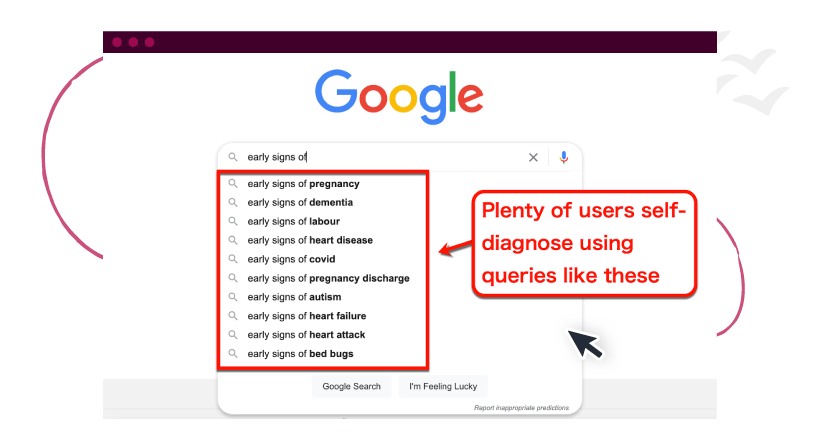
A successful healthcare content marketing strategy capitalizes on this user behavior to attract potential patients. The usual tactic is to produce guides or listicles that highlight symptoms and follow up with a call-to-action for booking a visit or reaching out via phone or email.
4. Point customers to online reviews
A survey conducted by Software Advice revealed that 71% of patients look for online reviews before choosing a new healthcare provider.
Online reviews and content marketing go hand in hand.
For one, content can be used to encourage more patients to write reviews about your brand. Positive reviews can then be utilized as user-generated content, which you can feature on your website or mention in your blog.
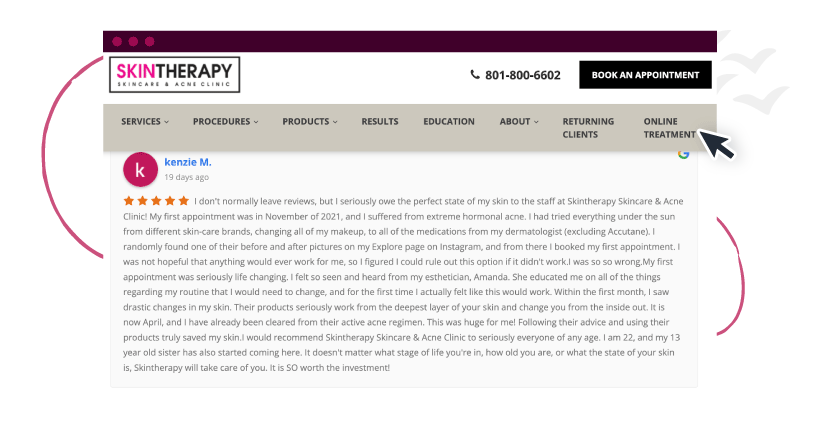
Healthcare content marketing trends to watch
Make no mistake that content marketing in healthcare can be extremely competitive.
To keep up with the fast-paced industry, here are four healthcare content marketing trends you need to pay attention to:
1. Reviews are king
As mentioned earlier, the vast majority of patients look for reviews before picking a healthcare service provider they’re unfamiliar with.
Reputation management, which includes review generation, may not exactly be in the same sphere as content marketing. But there are important overlaps that content marketers need to know about.
Building content about customer success stories, for example, gives you the opportunity to share positive reviews with prospects. It’s one of the best ideas for engaging content you can fall back on when your team’s creativity is running dry.
2. COVID-related posts are still in demand
It’s been a while since the global COVID-19 pandemic struck, but content around keywords like “quarantine” and “social distancing” still generates heaps of traffic.
Although healthcare websites massively benefit from evergreen topics, pressing issues and trends are great for storytelling.
Besides, another thing that makes COVID-19 unique is the possibility of long-term effects — aka “Long COVID.” Even if the pandemic itself is not as big of a threat as before, there will still be a demand for COVID-related information for years to come.
3. The availability of internal data is huge
In high-stakes industries like healthcare and finance, brands that can procure and present their own data have a huge advantage.
Original research on important topics, especially if the data translates (or can be translated) into practical and actionable tips, could propel your brand’s authoritativeness. It can set you apart from competitors that depend on information that can be found elsewhere.
Furthermore, publishing first-party research data could naturally attract links from other blogs. This can increase your search engine rankings over time without investing in link building.
4. Influencer marketing is making an impact
Influencer marketing is the practice of working with popular social media users or “influencers” to boost brand awareness.
It’s not a new strategy in the world of digital marketing, per se. But in the healthcare landscape, few brands are able to make it work.
A particular strategy is to have influencers test your products and document their experience through short-form videos. Influencers can also record a procedure you offer and post it on Instagram or TikTok.
Other healthcare experts leverage their knowledge to become influencers themselves, which works wonders for their online brand.
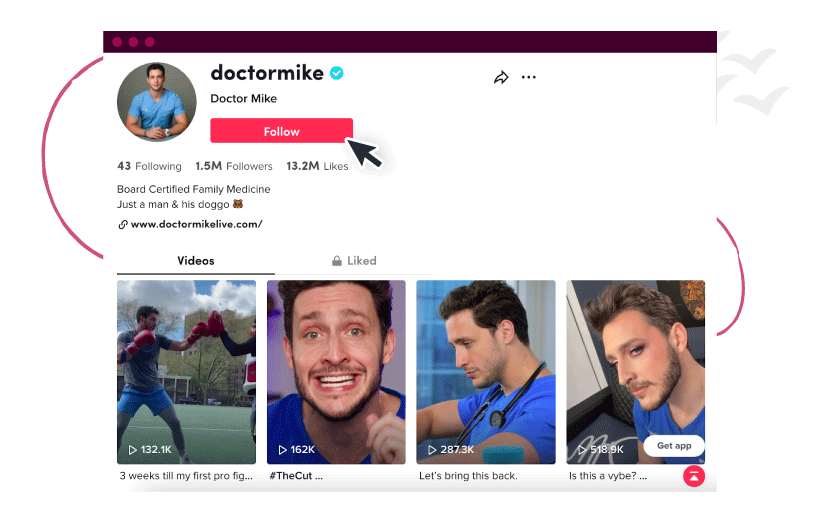
How to create quality content for healthcare organizations
The list of trends above is a great place to start. But there’s a lot more to healthcare content marketing than that, especially if you’re after long-term results.
1. Optimize content for local SEO
For healthcare brands, targeting the local audience in SEO makes perfect sense for a couple of reasons. First, it dilutes the competitiveness of your content marketing by targeting more specific, local keywords.
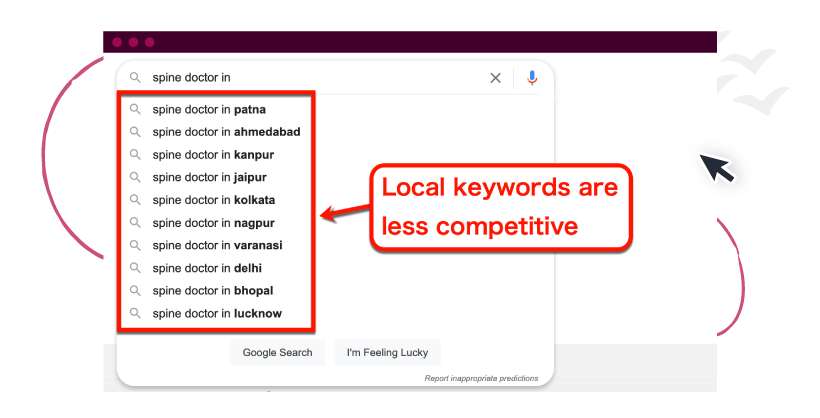
Second, local SEO makes sure your content efforts attract people who can actually drop a visit to your establishment.
Apart from writing articles optimized for local SEO, submit your business information on directories and platforms like Google Business Profile. This could literally put your healthcare brand on the map — making you searchable for local users.
2. Diversify your formats
Written articles are a staple in any brand’s content marketing strategy. But you shouldn’t restrict your healthcare brand’s presence to just blog posts.
If your competitors use short-form videos, infographics, or white papers, you need to follow suit. Doing so lets your brand reach a wider audience, including those with different content consumption preferences.
3. Communicate complex topics using simple language
One of the challenges of healthcare content marketing is talking about complicated and technical topics in front of non-technical users. To them, advanced medical terms may appear as jargon that will only bog down their learning experience.
A proven strategy is to focus more on the benefits and end goals of your target audience. Rather than discussing the nitty-gritty of the process, emphasize what they can gain using a language they understand.
4. Run surveys
Surveys and polls offer a low-cost opportunity for healthcare brands to obtain original data.
Platforms like Google Forms let you create visual surveys you could link to on your website or social media accounts. There are also built-in survey and poll features on Facebook, Instagram, and Twitter that healthcare brands can use for free.
5. Write guest posts
There are TONS of benefits healthcare organizations can get through guest posting.
Not only can healthcare companies get backlinks through guest posts, which helps out their SEO, but they also get better brand visibility and authority.
Publishing guest posts is a great way to piggyback on the authority of other healthcare companies. If you publish a guest post on reputable healthcare sites, then your audience will view you as an authority in your industry since you are featured on a reputable health-related website.
Healthcare content marketing examples
1. “InstaRetina” – Dr. Nagpal’s Retina Foundation and Eye Hospital
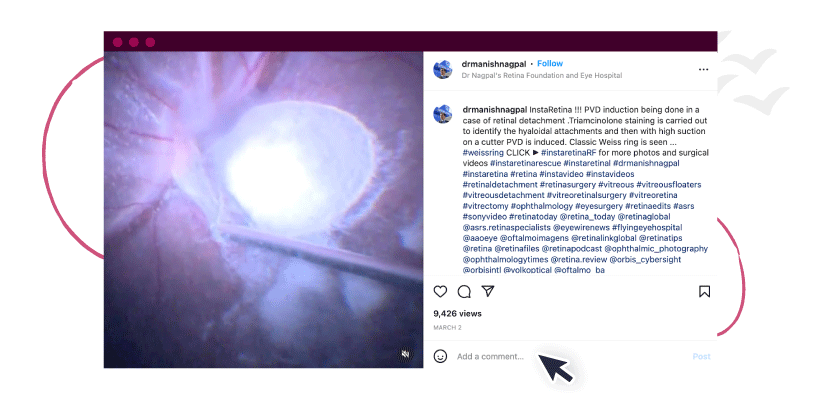
Procedure footage like Dr. Nagpal’s Instagram post is a good example of engaging short-form video content. In addition to the zoomed-in video, the post includes a detailed description of the video along with a list of relevant hashtags.
2. Mayo Clinic Blog
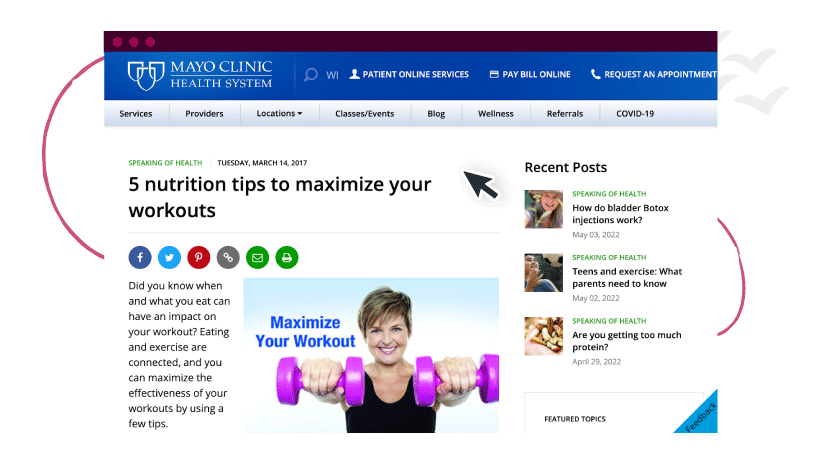
Mayo Clinic is a go-to source of medical information for people who aim to self-diagnose all sorts of symptoms. The blog also successfully solidified the brand’s authority when it comes to practical health advice.Check out the Mayo Clinic blog for medical content writing samples and inspiration.
3. Coronavirus Prevention — Medical News Today
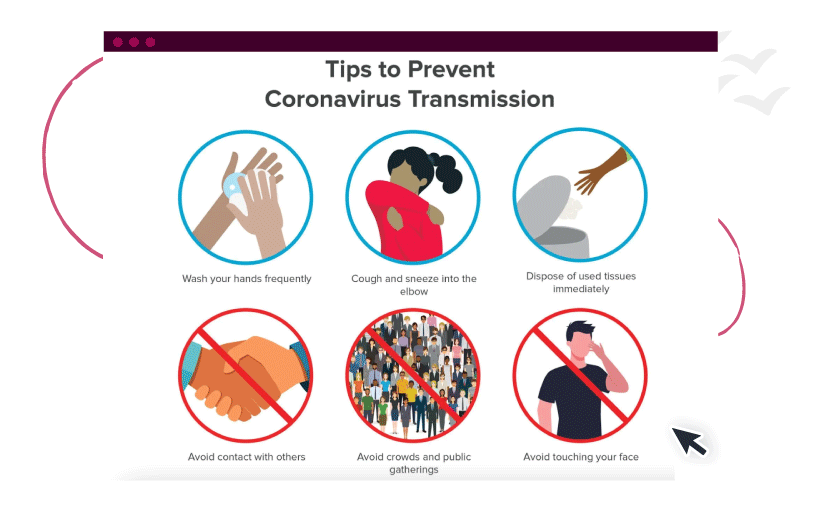
Infographics are commonly used to spread health and safety reminders, and Medical News Today is one of the most popular brands that use this strategy. What makes infographics great is that they’re easy to make, especially with tools like Canva and Piktochart.

FAQs about healthcare content marketing
Before you go, here are some healthcare content marketing FAQs answered:
1. How do you write healthcare content?
Conducting research and translating complex information into simpler, actionable tips are two of the most important steps in writing healthcare content. Be sure to research your audience and tailor your language based on their comprehension level.
2. Why is content marketing important in healthcare?
Content marketing allows healthcare brands to win the trust of the online audience. It gives them the opportunity to prove their expertise, reach a wider audience, and turn online readers into qualified sales leads.
3. Where can I find good content writers for a health blog?
Freelance marketplaces and social media groups can help you find experienced content writers in the healthcare industry. If you want guaranteed content quality, go for agencies with closely vetted healthcare sciences writers.
Springboard your healthcare content marketing strategy with ClearVoice
In almost every phase of your content marketing strategy, you need experts to supply you with top-quality content.
ClearVoice has a pool of vetted, seasoned healthcare content strategists and writer teams ready to grow your brand. Talk to a content specialist to get started building your healthcare content marketing blueprint today.



